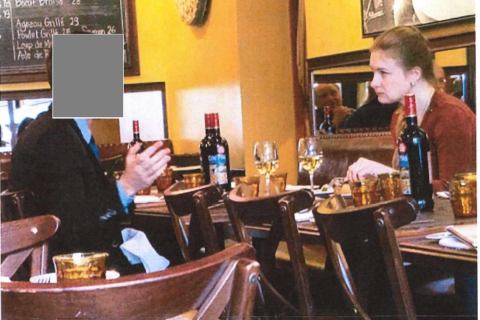WASHINGTON — Maria Butina, who is facing charges of working as a Russian agent in the U.S., was spirited from a D.C. detention facility to an Alexandria, Virginia, jail overnight after grumbling from the Russian government about her treatment in custody.
Butina’s attorney, Robert Driscoll, confirmed to WTOP that she had been transferred, without notice, Friday night.
The Kremlin had on multiple occasions accused the U.S. government of mistreating Butina in the week leading up to her abrupt transfer.
But it is not clear if the complaints from the Russian government led to her transfer.
On Wednesday, the Russian Foreign Ministry quoted spokesperson Maria Zakharova in a tweet after a press briefing, saying, “Despite our many requests, conditions in which Maria Butina is being held remain harsh & it has resulted in health issues. It seems like trying to complicate her life as much as possible in US they’d like to force her to cooperate w/ investigation.”

Zakharova was quoted the same day in a subsequent tweet making a more pronounced allegation: “Maria Butina’s health has deteriorated. It seems as if Washington is trying to force her to cooperate with the investigation by making her living conditions as difficult as possible.”
Butina has been receiving weekly consular visits from the Russia Embassy since being taken into custody, as are customary. But the Russian Embassy in Washington released a more extensive statement Thursday complaining about her treatment: “Russian diplomats in Washington managed to bring about an improvement in the conditions of her confinement. She was allowed to use the telephone and her food is better now. At the same time, in spite of our numerous requests, the rules remain onerous.”
The Kremlin’s statements seem to suggest her treatment, while in protective custody at the Central Treatment Facility in Southeast D.C., was guided by investigative interests as opposed to humane procedures.
But Driscoll told WTOP on Aug. 9 that Butina was doing as well as could be expected “for someone in jail,” and that she had already “spoken to her family in Russia,” indicating that issues she had experienced while in custody were being worked out.
However, following Zakharova’s allegations, Driscoll said Friday that Butina was “having some swelling with her arthritis. We are working with the jail.”
Driscoll also indicated there were concerns about how much time she could spend outside of her cell.
On Friday afternoon, several hours before her transfer, a U.S. Marshals Service spokesperson told WTOP in a statement, “We have been made aware of the grievances filed regarding detainee Ms. Maria Butina. As a matter of policy, we do not disclose information related to individual prisoners to protect their privacy, safety and security.”
All detention facilities used by the Marshal Service to house federal prisoners have policies and procedures regarding grievances.
The Marshal Service also said in its statement that the agency “is responsible for the safe, secure and humane care of approximately 57,000 federal prisoners daily. While the USMS does not own or operate its own detention facilities, we monitor the custody and care of our prisoners with the over 1,000 facilities we have agreements with.”
Driscoll told WTOP on Saturday, “I think the Russians are upset that, at night, they check every 15 minutes on inmates in protective custody. Some guards turn on the lights to do so. This can be problematic, because you never really sleep. Some use flashlights, which is better.”
Butina was arrested on July 15 and charged with “conspiracy to act as an agent of the Russian Federation within the United States without prior notification to the Attorney General.”
Federal prosecutors, who watched her for several years, said in a detention memo, “Although she attended classes and completed coursework with outside help, attending American University was Butina’s cover while she continued to work on behalf of the Russian official.”
The “official” referenced in the memo was part of a group that allegedly included Butina and “known and unknown individuals who knowingly did combine, conspire, confederate, and agree together and with each other to commit an offense against the United States,” according to a criminal complaint from the U.S. attorney for D.C., Jessie K. Lui.
The indictment accused Butina of being a foreign agent affiliated with Russian intelligence, who allegedly attempted “to exploit influential U.S. persons connected to American political organizations.”
Her task, according to the documents, was to allegedly develop “relationships with U.S. persons, and infiltrating organizations having influence in American politics, for the purpose of advancing the interests of the Russian Federation.”
The U.S. attorney’s office for the District of Columbia declined to comment on the situation.
Butina’s next court appearance is Sept. 10.






